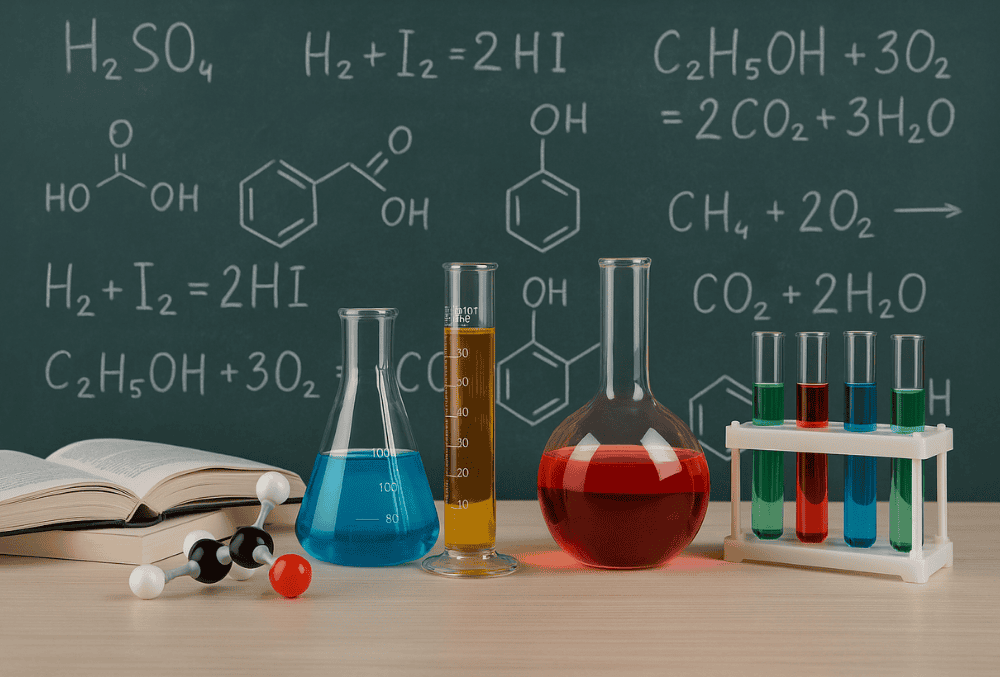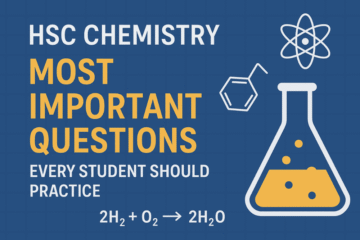Understanding the ATAR Chemistry curriculum is crucial for any Australian high school student aiming for a competitive university admission rank. Whether you’re a student preparing to take ATAR Chemistry or a parent trying to support your child through this demanding subject, this guide will walk you through the curriculum’s structure, topics, expectations, and assessment formats.
In this blog, we’ll cover:
-
What ATAR Chemistry is
-
Why it matters for university entrance
-
An overview of Year 11 and Year 12 content
-
Key skills and knowledge areas
-
Assessment formats
-
Study tips for excelling in ATAR Chemistry
-
How an online chemistry tutor can make a difference
What Is ATAR Chemistry?
ATAR Chemistry is a senior secondary science course studied in Year 11 and Year 12 across Australia. As part of the Australian Tertiary Admission Rank (ATAR) system, it is a subject that contributes directly to a student’s university entrance score. But more than just a requirement, ATAR Chemistry provides deep insights into the properties, structures, and reactions of substances, offering students a strong foundation in scientific thinking.
The subject is ideal for students interested in pursuing degrees in medicine, dentistry, pharmacy, engineering, environmental science, or any field that involves understanding matter and energy. It teaches not only scientific content but also valuable academic skills like problem-solving, analytical reasoning, research, and lab-based inquiry.
Why ATAR Chemistry Matters for University Entrance
Many competitive university programs in Australia require Chemistry as a prerequisite. For example, degrees in medical science, biomedical engineering, pharmacology, and veterinary science often list Chemistry as essential. Even when it isn’t a mandatory requirement, having studied Chemistry gives students a significant advantage in first-year university science subjects, many of which assume a working knowledge of high school Chemistry.
In addition to subject-specific knowledge, the course develops a range of transferable skills. Students gain experience in critical thinking, experimental design, quantitative reasoning, and scientific communication — all of which are highly valued in higher education and the workforce. For students aiming to boost their ATAR and meet course requirements for tertiary programs, ATAR Chemistry is a smart and strategic choice.
Year 11 and Year 12 Curriculum Overview
ATAR Chemistry is divided into four units — two in Year 11 and two in Year 12. Each unit builds on previous knowledge and increases in complexity.
Year 11 – Laying the Foundation
Unit 1: Chemical Fundamentals
Students begin by exploring the structure of atoms and molecules, the periodic table, and different types of chemical bonds — ionic, covalent, and metallic. This unit also introduces basic chemical equations, the mole concept, and calculations involving molar mass and percentage composition. Students learn to write and balance equations, use chemical formulas, and classify types of reactions.
Unit 2: Molecular Interactions and Reactions
In this unit, students investigate how molecules interact and how chemical reactions occur. They study intermolecular forces (like hydrogen bonding and dispersion forces), solubility, acids and bases, and reaction kinetics. Thermochemistry — the study of heat changes in reactions — is also covered, introducing students to enthalpy, calorimetry, and energy diagrams.
Year 12 – Advanced Topics and Real-World Applications
Unit 3: Equilibrium, Acids, and Redox Reactions
This unit takes a deeper look into systems in equilibrium, Le Chatelier’s Principle, and the effect of concentration, temperature, and pressure on equilibrium systems. Students learn how to calculate equilibrium constants and interpret graphs. Acid-base theory is extended to include buffers and titrations, and redox reactions are introduced, including oxidation numbers and electrochemical cells.
Unit 4: Organic Chemistry and Chemical Synthesis
Students study organic molecules such as hydrocarbons, alcohols, esters, and carboxylic acids. They learn about different types of organic reactions, including substitution, addition, and condensation. This unit also includes polymer chemistry and analytical techniques like chromatography, infrared spectroscopy, and mass spectrometry. Students apply their knowledge to design synthetic pathways and analyse real-world chemical problems.
What Skills Does ATAR Chemistry Build?
Scientific Inquiry and Investigation
Students learn how to formulate hypotheses, design experiments, and interpret results. They’re taught to control variables, make accurate observations, and document findings in structured formats like lab reports and journals. Scientific inquiry fosters curiosity, precision, and critical thinking.
Data Analysis and Calculation
A major component of Chemistry is interpreting graphs, equations, and experimental data. Students calculate concentrations, energy changes, and pH values, and learn to use formulas in context. This requires strong numeracy skills, and students struggling in this area may benefit from working with a maths tutor to reinforce key concepts
Critical Thinking and Problem Solving
ATAR Chemistry trains students to think logically and apply principles to unfamiliar scenarios. Whether they’re explaining anomalous results, predicting reaction outcomes, or analysing a set of spectroscopic data, students build strong reasoning abilities.
Communication and Reporting
Students are taught how to write clear, concise lab reports that include hypotheses, methods, results, and scientific conclusions. They also learn to use scientific vocabulary and diagrams to present ideas, which is crucial for future academic and professional writing.
How Is ATAR Chemistry Assessed?
Assessment varies slightly between Australian states but generally includes both school-based assessments and a final external examination.
School-Based Assessments
These are conducted throughout the year and contribute to the final school grade. They may include:
-
Written tests on theoretical knowledge
-
Practical experiments and reports
-
Research tasks and investigations
-
Extended response questions requiring analysis
These assessments develop depth of understanding and help students learn how to apply theory in practical contexts.
External Examination
At the end of Year 12, students sit for a final written exam, usually set by the state examination authority. This is a major component of their ATAR score.
The exam typically includes:
-
Multiple-choice questions
-
Short-answer questions
-
Extended-response questions
Students are expected to demonstrate knowledge of all four units, solve numerical problems, and apply their understanding in novel situations. Practising under exam conditions and working with an online chemistry tutor can significantly improve confidence and performance in this final assessment.
Practical Work
Hands-on lab skills are developed through regular practical sessions. Although practical work may not be formally examined in the external paper, it is assessed internally. Students must demonstrate safe lab practices, accurate measurement, and the ability to explain the purpose and outcome of experiments in written form.
Study Tips for ATAR Chemistry Success
1. Master the Basics Early
A strong understanding of the fundamentals — atoms, bonding, moles, and reaction types — is critical. These concepts appear again and again throughout the course. Use your early study time to build a solid foundation that will support you in Year 12.
2. Make Use of Visuals
Diagrams, mind maps, and flowcharts can make complex systems more manageable. Try creating reaction pathway maps or using colour-coded notes to remember functional groups and mechanisms in organic chemistry.
3. Practise Past Exam Papers
Solving previous years’ exams under timed conditions can help you get familiar with the format and expectations. It’s a good way to build stamina, speed, and confidence. Focus on reviewing incorrect answers to identify your weak points.
4. Focus on Lab Skills
Don’t underestimate the value of practical work. Try to understand why you’re doing each step of an experiment — not just how to do it. Write clear, logical lab reports that link results back to theory.
5. Work with a Tutor If Needed
ATAR Chemistry is a content-heavy subject. If you’re struggling with any topic, working with an online chemistry tutor can help you catch up and stay on track. Tutors can simplify challenging ideas, offer extra practice, and tailor support to your learning style. If numerical tasks are difficult, adding support from a maths tutor can also help.
How an Online Chemistry Tutor Can Help
One-on-one tutoring can make a big difference in a subject as detailed and fast-paced as ATAR Chemistry. A qualified online chemistry tutor provides:
-
Personalised explanations tailored to your learning style
-
Help with difficult topics like equilibrium, redox, or organic synthesis
-
Guidance on how to approach exam questions
-
Support with lab report writing and internal assessments
Since tutoring is online, students can learn from anywhere and at flexible times. Many tutors also offer digital resources, summaries, and practice questions.
Tutoring is especially helpful for students juggling multiple subjects or aiming for high ATAR scores. By identifying weak spots early, a tutor helps reduce exam stress and boosts long-term retention.
Supporting Chemistry with Maths Tutoring
Chemistry relies heavily on calculations — from molar mass to titration formulas, and from equilibrium constants to pH calculations. Many students who enjoy the theory of Chemistry find the maths challenging.
That’s where a maths tutor can support students taking ATAR Chemistry. A maths tutor helps break down complex formulas, clarify algebraic manipulation, and improve overall numerical confidence. Combining Chemistry and Maths tutoring can be a powerful way to build problem-solving skills and prepare for exams.
What Parents Should Know
As a parent, you don’t need to be a chemistry expert to support your child. Here are some ways you can help:
-
Encourage regular, structured study sessions
-
Provide a quiet, distraction-free environment for revision
-
Help them access resources like past papers and tutoring support
-
Monitor their progress and check in regularly about how they feel
If your child feels overwhelmed, consider arranging support early. Whether it’s an online tutoring session or help managing their schedule, early intervention is better than last-minute stress before exams.
Final Thoughts
ATAR Chemistry is one of the most rewarding subjects a student can study in high school. It combines deep content knowledge with valuable academic skills like data analysis, communication, and logical reasoning. Whether your child is planning a future in science or just wants to perform well in a key subject, success in Chemistry can open many doors.
By understanding the course structure, preparing consistently, and using support tools like an online chemistry tutor or a maths tutor, students can approach this subject with confidence. With the right approach, ATAR Chemistry doesn’t have to be daunting — it can be a stepping stone toward academic and career success.




